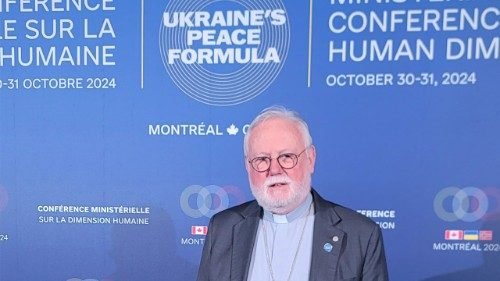At the second “Ministerial Conference on the Human Dimension of Ukraine’s Peace Formula” held in Canada, the Vatican Secretary for Relations with States upholds the Vatican’s commitment to securing the return of captive Ukrainian minors, military personnel, and civilians.
By Salvatore Cernuzio
The Vatican has reiterated its commitment to continuing its humanitarian work to secure the release of captured Ukrainian minors, military personnel, and civilians. At the “Ministerial Conference on the Human Dimension of Ukraine’s Peace Formula Conference” in Montreal, Canada, Archbishop Paul Richard Gallagher said “unfortunately, the results have not met expectations” perhaps because the entrusted cases “are more complicated.” This conference is the second international summit on the peace formula proposed by Ukrainian President Volodymyr Zelensky; the first summit was in Switzerland last June. The two-day event (October 30-31) focused on “Proposal Number 4” of the ten points that make up the formula: the “release of all prisoners and deportees.” Since the Russian invasion of Ukraine, this is the mission the Holy See has undertaken, “welcoming,” the Vatican Secretary for Relations with States noted, “the repeated requests of Ukrainian authorities.
Zelensky’s request and Zuppi’s mission
President Zelensky first appealed to the diplomatic network of the Holy See regarding the release of over 19,000 Ukrainian minors forcibly taken to Russia and the exchange of prisoners. The process has led to concrete results, such as the release of two Ukrainian Redemptorists on June 29 this year and the return of a group of minors. The Ukrainian President reiterated his request for the Pope’s help during an audience—his third in the Vatican—on October 11.
This type of humanitarian assistance was “the primary objective of Cardinal Zuppi’s mission to Kyiv and Moscow,” stated the Vatican Secretary for Relations with States, referring to the visit Cardinal Zuppi, the President of the Italian Bishops’ Conference made to Ukraine and Russia in the summer of 2023 (with stops in the U.S. and China) as the Pope’s emissary to find paths to a “just peace” for the “martyred” country. Cardinal Zuppi returned to Moscow on October 14 and 15 this year. This mission, Archbishop Gallagher emphasized, “has led to the creation of a framework for the repatriation of children and the regular exchange of information between the two parties. This also included online meetings with the participation of the apostolic nuncios in both countries.” Archbishop Visvaldas Kulbokas in Ukraine and Archbishop Giovanni d’Aniello in Russia.

Cardinal Zuppi traveled to Moscow and met with Metropolitan Antonij of Volokolamsk on October 15
The help of the two Apostolic Nuncios
Archbishop Gallagher stated, “the direct contact between the parties, especially with the presence of the two apostolic nuncios, is helpful in facilitating dialogue.” In particular, the Vatican Secretary for Relations with States reported, Archbishop Kulbokas “has identified the Catholic institutions ready to welcome families with repatriated minors.” Meanwhile, “the Holy See reiterates its requests for new lists of children.” He stressed that the Vatican has “also forwarded thousands of names of prisoners, calling for their exchange and release. It also supports the proposal to establish joint medical commissions for prisoners with serious medical conditions, backs the request of the families of Ukrainian prisoners to deliver humanitarian aid to them, and calls on Russia to return the deceased Ukrainian soldiers.”
The situation of Russian prisoners in Ukraine
The Nuncio in Kyiv also informed Archbishop Gallagher he “visited some of the Russian prisoners in Ukraine, noting their good conditions.” A similar assurance regarding the conditions of Ukrainian prisoners was given by the Ombudswoman of the Russian Federation—the civic defender of Russia, officially appointed as the Commissioner for Human Rights—“but the Holy See is unable to verify their situation.”
No to instrumentalization
In conclusion, Archbishop Gallagher urged “the parties to refrain from any instrumentalization of humanitarian issues” and reiterated “the need for a commitment to finding solutions to humanitarian emergencies also as a goodwill gesture towards peace.”



